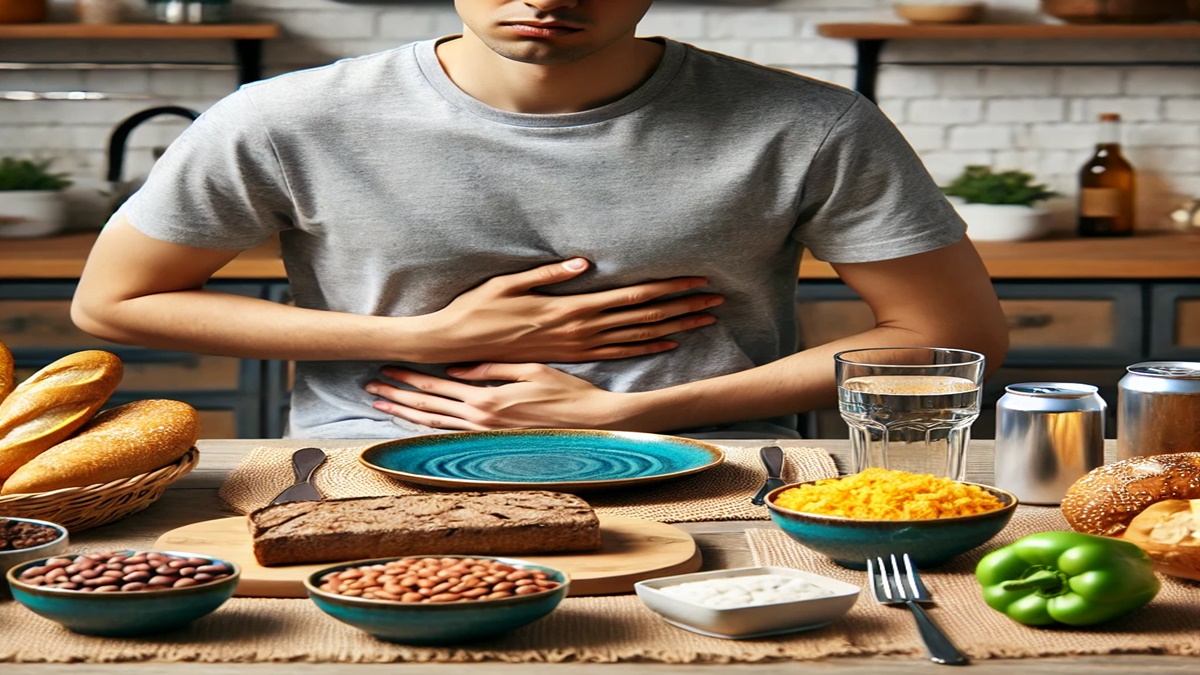Introduction
Bloating after meals can be uncomfortable, leaving you feeling heavy, gassy, and sluggish. Understanding how to reduce bloating after meals can significantly improve your overall digestive health and quality of life. This guide covers practical strategies, lifestyle changes, and dietary adjustments that can help you beat bloating for good.
Causes of Bloating After Meals
Bloating often stems from digestive issues or eating habits. The most common causes include:
- Digestive Disorders: Conditions such as Irritable Bowel Syndrome (IBS) can lead to bloating.
- Food Intolerances: Certain foods like lactose (in dairy) and gluten can trigger bloating in sensitive individuals.
- Overeating: Consuming large portions at once strains your digestive system and can cause bloating.
Tips on How to Reduce Bloating After Meals

Eat Smaller Portions More Frequently
- Eating large meals can overload your digestive system. Opt for smaller, more frequent meals to prevent bloating.
- This helps regulate digestion and reduces the risk of excessive gas buildup.
Chew Your Food Properly
- Taking the time to thoroughly chew your food eases the burden on your digestive system, reducing gas and bloating.
- Digestion begins in the mouth, so slow down and chew every bite.
Avoid Carbonated Drinks and Artificial Sweeteners
- Carbonated drinks release carbon dioxide in the digestive tract, leading to bloating.
- Artificial sweeteners like sorbitol and xylitol are harder to digest and may cause gas.
Stay Hydrated Throughout the Day
- Proper hydration aids digestion by helping food pass through your intestines more easily.
- Aim to drink water before and after meals, but avoid drinking large amounts during meals.
Limit High-FODMAP Foods if Necessary (H3)
- FODMAPs (Fermentable Oligo-, Di-, Mono-saccharides And Polyols) are short-chain carbohydrates that some people find difficult to digest.
- Common high-FODMAP foods include onions, beans, and certain fruits.
- Consider consulting a nutritionist to see if a low-FODMAP diet is right for you.
Incorporate Probiotics and Fermented Foods
- Probiotics, found in yogurt, kefir, and supplements, can promote a healthy gut microbiome.
- Role of probiotics in reducing bloating: Probiotics help maintain a balance of good bacteria, which aids digestion and reduces bloating.
Lifestyle Changes to Reduce Bloating
Regular Physical Activity
- Moving your body helps promote digestion and can relieve bloating.
- Activities like walking after meals can improve digestion by helping food move through your system.
- Benefits of walking after meals: Walking for 10-15 minutes post-meal can ease digestion.
Manage Stress Levels
- Stress can significantly impact your digestion, leading to bloating.
- Techniques like yoga, meditation, and deep breathing exercises can help.
Adopt a Consistent Eating Schedule
- Eating at the same times daily allows your digestive system to anticipate and better process meals.
Foods to Include and Avoid for Reducing Bloating
Foods to Include
- High-fiber Fruits and Vegetables: Examples include papaya and leafy greens.
- Herbal Teas: Peppermint and ginger teas are known for their soothing effects on the digestive tract.
Foods to Avoid
- Processed Foods: These are often high in sodium and additives that can contribute to bloating.
- Sugary and Fatty Foods: Excess sugar and fat can slow down digestion.
When to Seek Medical Attention
- Chronic or persistent bloating may signal an underlying medical condition.
- Symptoms like severe abdominal pain, weight loss, or blood in the stool should prompt a visit to a healthcare professional.
- Signs of serious digestive problems include persistent symptoms not relieved by lifestyle changes.
20 FAQs on How to Reduce Bloating After Meals
- What causes bloating after eating?
- Bloating can result from overeating, food intolerances, digestive disorders, or eating gas-producing foods.
2. How quickly can I reduce bloating?
- Relief can be achieved within a few hours with hydration, movement, and avoiding problematic foods.
3. Do probiotics help with bloating?
- Yes, probiotics promote a healthy gut and reduce gas production.
4. Is bloating after every meal normal?
- No, frequent bloating may indicate a digestive disorder and should be evaluated by a doctor.
5. What foods reduce bloating fast?
- Ginger, peppermint tea, and papaya are known to reduce bloating quickly.
6. Can drinking water reduce bloating?
- Yes, staying hydrated supports proper digestion.
7. Is bloating linked to stress?
- Yes, stress can disrupt digestion, leading to bloating.
8. Do certain exercises help with bloating?
- Light activities like walking and yoga can aid digestion and reduce bloating.
9. Should I avoid dairy to prevent bloating?
- If you’re lactose intolerant, avoiding dairy may help.
10. Can high-fiber foods cause bloating?
- In excess, fiber can cause gas; moderation and proper hydration are key.
11. How do carbonated drinks affect bloating?
- They release carbon dioxide, which may contribute to gas buildup.
12. Does eating fast lead to bloating?
- Yes, eating quickly can cause you to swallow air, leading to gas.
13. What is mindful eating?
- Eating slowly and being aware of your food choices to aid digestion.
14. Can artificial sweeteners cause bloating?
- Yes, many sweeteners are hard to digest and may cause gas.
15. Are high-FODMAP foods bad for everyone?
- No, but some people are sensitive to them and may experience bloating.
16. Does chewing gum cause bloating?
- Chewing gum can lead to swallowing air, which may cause gas.
17. How does overeating lead to bloating?
- It overloads the digestive system, slowing down food processing.
18. What lifestyle changes can reduce bloating?
- Regular exercise, hydration, and stress management are effective strategies.
19. Does skipping meals cause bloating?
- Yes, as it may lead to overeating at subsequent meals.
20. When should I see a doctor for bloating?
- If bloating is persistent or accompanied by
